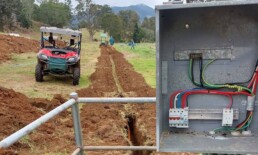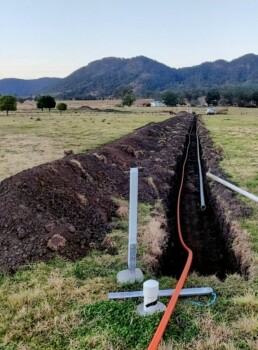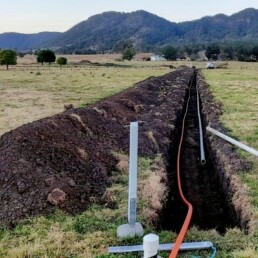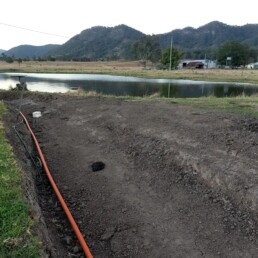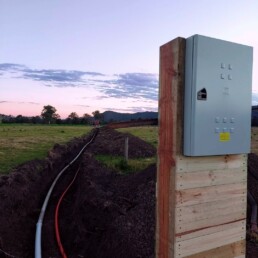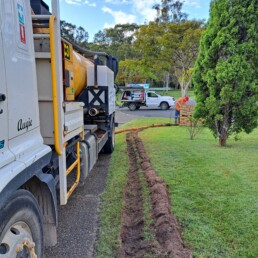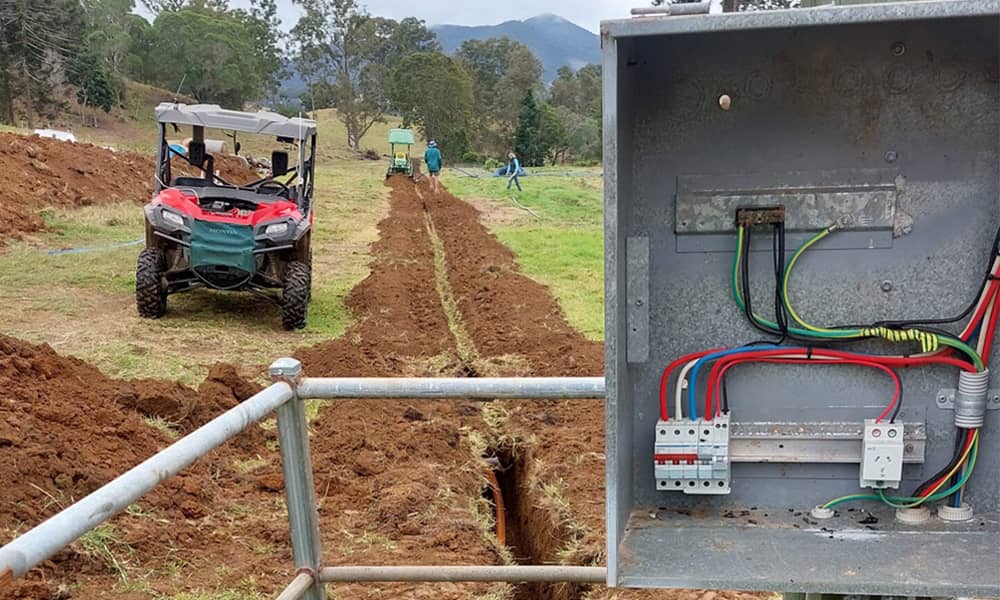Underground Electrical Power in Rural Queensland
Top Challenges Faced by Underground Electrical Installations in Rural Regions of Queensland
Coastal Queensland poses unique challenges for underground electrical installations. From the urban hubs of Ipswich and Toowoomba to the rural landscapes of Esk, the need for reliable infrastructure is paramount. In this blog, we explore the top challenges faced by electricians.
Corrosive Coastal Environment
The coastal environment in Queensland’s high humidity accelerates metal corrosion in underground electrical installations. This corrosion compromises equipment integrity and increases the risk of faults and failures. Brad Kennedy Electrical addresses this by using advanced corrosion-resistant materials and coatings, ensuring long-term reliability.
Subsurface Complexity
Coastal regions exhibit diverse subsurface conditions. Rocky terrains in Toowoomba and Ipswich and clay soils in Esk present challenges. Specialised drilling and stability measures are necessary. Brad Kennedy Electrical uses innovative solutions to navigate subsurface challenges, optimising installation practices for enhanced resilience.
Extreme Weather
Queensland’s coastal areas are prone to cyclones, floods, and storms, threatening underground electrical rural infrastructure. Disruptions and damage are common, compromising reliability and safety. Brad Kennedy Electrical adopts proactive measures, incorporating robust design practices and strategic planning to fortify systems against adverse weather conditions, minimising downtime.
Environmental Compliance
Stringent regulations in Queensland mandate eco-friendly practices for underground electrical installations. Compliance is essential to minimise ecological impact. Brad Kennedy Electrical prioritises environmental stewardship, meticulously adhering to regulatory requirements and integrating sustainable practices into their work.
Utility Connections
Connecting underground electrical installations with utilities such as Energex and Ergon requires navigating bureaucratic procedures. Brad Kennedy Electrical understands these complexities, maintaining close communication with utility providers to ensure a smooth transition from installation to activation, facilitating reliable electricity supply.
Despite the challenges posed by coastal Queensland’s environment, electricians like Brad Kennedy Electrical demonstrate expertise in navigating complexities and delivering reliable solutions. Through innovation and a deep understanding of local conditions, they overcome obstacles and illuminate coastal Queensland with sustainable infrastructure. Collaboration between electricians, regulators, utilities, and communities is crucial for ensuring resilience and longevity in underground electrical installations
Exploring the Advantages of Underground Power Installation in Toowoomba
Exploring the Advantages of Underground Power Installation in Toowoomba
What is Underground Power?
Underground power installation involves burying cables beneath the ground instead of hanging them on poles above. These cables, typically made of durable materials like PVC or polyethylene, deliver electricity safely and reliably to various locations.
A bit about Toowoomba
Toowoomba’s natural beauty and urban charm benefit greatly from underground power infrastructure. Unlike overhead lines, which can clutter the skyline and disrupt the landscape, underground installations blend seamlessly with the surroundings. This aesthetic enhancement enhances property values and creates a more visually appealing environment for everyone.
Reliability and Durability of Underground Power
One of the standout features of underground power is its reliability. Being buried underground protects the cables from weather damage, fallen trees, and accidental vehicle collisions. This means fewer service disruptions, especially during storms or adverse weather conditions, ensuring a steady supply of power for residents and businesses.
Safety First
Safety is paramount in any electrical project, and underground power installations excel in this area. With no exposed wires hanging overhead, the risk of accidents or electrical hazards is significantly reduced. This is crucial in densely populated areas like Toowoomba, where buildings and structures are in close proximity to power lines. Check out our completed projects.
Environmental Friendliness
Underground power installations contribute to environmental sustainability by reducing visual pollution and minimizing the need for tree trimming to accommodate overhead lines. Additionally, the longevity of underground cables means less maintenance and fewer replacements, resulting in lower carbon emissions and resource consumption over time.
Cost-Effectiveness in the Long Run
While the initial installation costs of underground power systems may be slightly higher, the long-term benefits outweigh the investment. With lower maintenance expenses and fewer repairs needed, underground installations save money over time. Plus, the improved aesthetics and reliability can increase property values and attract investment, benefiting the local economy.
Embracing the Future
In conclusion, underground power installation offers a host of advantages for Toowoomba. From enhancing aesthetics and reliability to promoting safety and sustainability, this modern approach to power distribution is shaping a brighter future for the region. As Toowoomba continues to grow and evolve, embracing underground power will play a crucial role in building a resilient, sustainable, and thriving community for generations to come.
NEED UNDERGROUND POWER?
Brad Kennedy Electrician services Toowoomba and all surrounding areas such as Logan, Esk.
Give Brad a call 0427 663 334
Benefits of Underground Power & Cabling
Benefits of Underground Power & Cabling
The power grid is a crucial infrastructure that enables our modern way of life. While most of us take electricity for granted, the way it’s delivered matters. In this blog post, we’ll explore the benefits of underground power, which is becoming an increasingly popular alternative to traditional overhead power lines in Australia. From improved reliability to reduced environmental impact, there are many advantages to underground power that we’ll dive into. So, let’s explore how this innovative technology is changing the way we power our world.
More reliable and less vulnerable to weather-related disturbances such as high winds, heavy rain, or snow.
Underground electrical systems are less vulnerable to weather-related disruptions as the cables and equipment are buried underground, away from harsh weather conditions. This means that power outages due to weather events are less frequent, and the system can better withstand natural disasters such as hurricanes, tornadoes, and snowstorms.
Less visually obtrusive, underground cabling makes them more aesthetically pleasing
Unlike overhead electrical systems, underground electrical systems are not visually obtrusive. The cables and equipment are buried underground, and there are no poles or wires obstructing the view, making them a preferred option in residential and commercial areas.
Reduced risk of accidental contact with power lines, which can be dangerous and potentially fatal
Overhead power lines can be a safety hazard as they can come into contact with buildings, trees, or other structures, posing a risk of electrocution. Underground electrical systems eliminate this risk, as the cables and equipment are buried below the ground.
Less susceptible to damage from falling objects or vehicle collisions compared to overhead lines
Overhead power lines are vulnerable to damage from falling objects, such as trees or branches, or vehicle collisions. Underground electrical systems are protected from such damage, as the cables and equipment are buried below the ground.
Reduced maintenance costs, as there is no need for regular trimming of trees or vegetation that can interfere with overhead lines
Overhead power lines require regular maintenance to trim trees and vegetation that can interfere with the lines, leading to power outages. Underground electrical systems eliminate this need, as the cables and equipment are buried underground and do not require regular maintenance.
Increased lifespan of equipment, as underground cables and equipment are protected from the elements and have a longer lifespan than overhead systems
Underground electrical systems are protected from harsh weather conditions, which can lead to damage or corrosion of equipment. This means that underground cables and equipment have a longer lifespan than overhead systems.
Can accommodate increased power demand, as underground cables can carry more power compared to overhead lines
Underground cables can carry more power compared to overhead lines, making them suitable for areas with high power demand. This is because underground cables have a lower resistance to electrical current, which means less energy is lost as heat during transmission.
Offers increased security, as underground cables are less susceptible to theft or tampering compared to overhead systems
Overhead power lines are vulnerable to theft and tampering, as they can be accessed easily. Underground electrical systems eliminate this risk, as the cables and equipment are buried below the ground, making them less susceptible to theft or tampering.
Get reliable, safe, and visually pleasing electrical systems that are less vulnerable to weather disturbances and other hazards. Contact us today to learn more about how we can help you with your underground electrical needs.
What Is an Underground Electrician?
What Is an Underground Electrician?
Are you curious about the world of underground electricians? You might have heard the term before, but aren’t quite sure what it means or what these electricians actually do. In this blog post, we’ll take a closer look at the profession of underground electricians, including their job duties, training requirements, and the types of projects they work on. Whether you’re a homeowner looking to better understand your electrical system or simply interested in learning about an important trade, keep reading to discover the ins and outs of what an underground electrician does.
What is underground electrical?
Underground electrical refers to the system of electrical wiring and components that are installed beneath the ground surface. In this system, electric power is delivered to homes, buildings, and other structures through a network of underground cables and conduits, rather than through overhead wires that are mounted on poles or towers.
Underground electrical systems offer several advantages over above-ground systems. They are more aesthetically pleasing and do not obstruct views, and they are less susceptible to damage from extreme weather conditions, such as high winds or ice storms.
However, installing underground electrical systems can be more expensive than overhead systems, due to the need for trenching and laying underground cables. Additionally, repairing faults in underground electrical systems can be more challenging, as locating and accessing the fault requires excavation off the ground.
What type of work does an underground electrician do?
Underground electricals typically manage the installation, repair, or maintenance of electrical systems that are located underground. This type of work may include:
- Trenching: This involves digging trenches in the ground to install electrical conduits, which are used to protect and route electrical wiring underground.
- Cable installation: This involves laying electrical cables in the trenches and connecting them to electrical panels or other equipment.
- Conduit installation: This involves installing protective conduits around electrical cables to prevent damage from external factors such as weather, animals, or people.
- Grounding: This involves connecting electrical systems to the earth through grounding rods or other grounding methods to prevent electrical shock or damage.
- Backfilling: This involves filling the trenches with soil after the electrical cables and conduits have been installed.
- Testing and Inspection: This involves testing the electrical systems to ensure they are working properly and are up to code, and inspecting the work for safety and compliance with local regulations.
Overall, underground electrical work is a complex and technical process that requires specialized knowledge and equipment. It is typically carried out by licensed and trained electrical professionals.
What qualifications does an Underground Electrician need?
In Queensland, Australia, to work as an underground electrician, one would typically need to hold a Certificate III in Electrotechnology Electrician (UEE30811) or equivalent. This is a nationally recognized qualification that covers the skills and knowledge required to work in the electrical industry, including underground electrical installations.
To obtain this qualification, an individual would usually need to complete an apprenticeship in electrical installation and maintenance. This involves a combination of on-the-job training and off-the-job study at a registered training organisation.
What is the difference between a normal electrician and an underground electrician?
The main difference between a normal electrician and an underground electrician is the type of electrical work they perform. Normal electricians work on electrical systems that are visible and accessible, such as overhead power lines, electrical panels, and wiring within buildings. They install, repair, and maintain electrical systems in residential and commercial buildings, and are trained to work safely with electricity in these environments.
On the other hand, underground electricians specialize in the installation, repair, and maintenance of electrical systems that are buried underground. This includes underground cables, transformers, and other equipment used to distribute power to homes and businesses. They are trained to work with high-voltage cables and have the necessary knowledge and skills to work underground safely. Underground electricians must also have a thorough understanding of excavation and trenching techniques, as they may need to dig trenches to lay cables or access equipment for repairs.
Additionally, underground electricians often require specialized equipment and tools to complete their work. For example, they may use cable locators to locate underground cables or trenchers to dig trenches for cable installation. They may also require specialized safety equipment, such as gas detectors, to ensure safe working conditions in underground environments.
Get reliable, safe, and visually pleasing electrical systems that are less vulnerable to weather disturbances and other hazards. Contact us today to learn more about how we can help you with your underground electrical needs.

